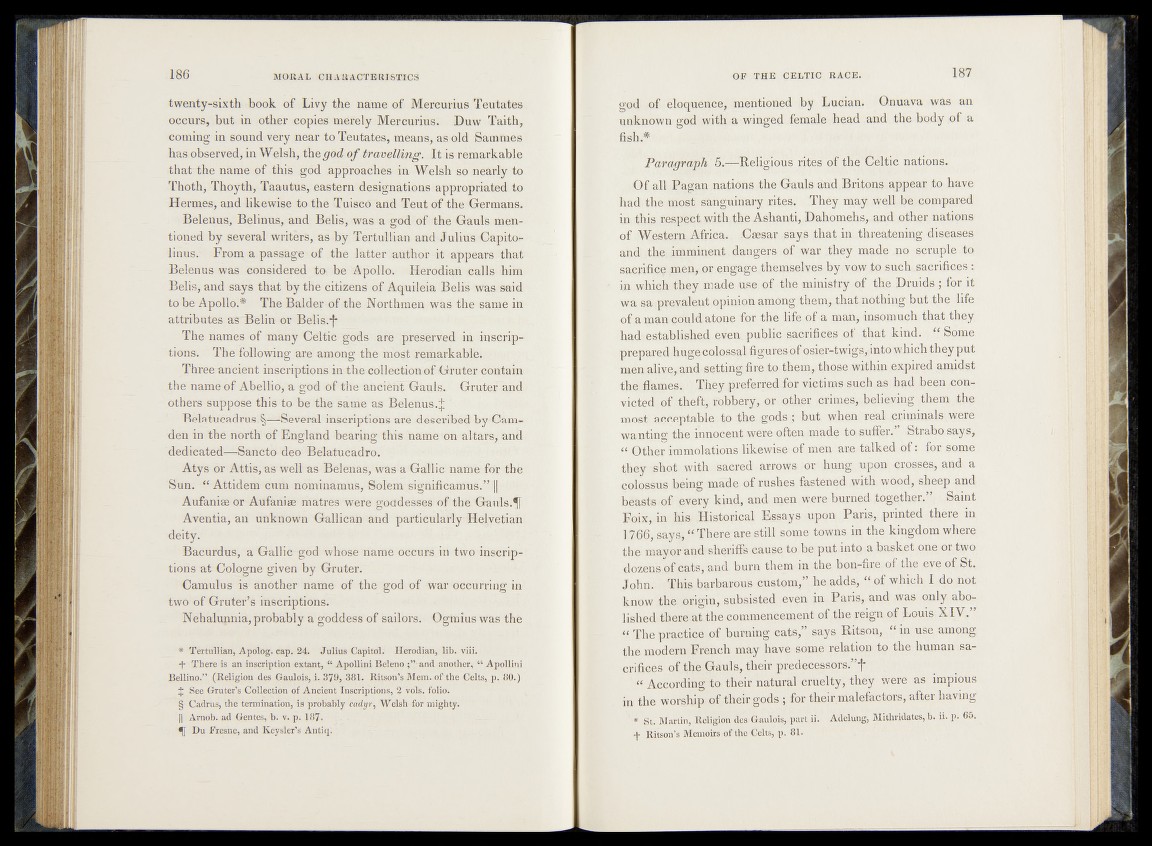
twenty-sixth book- of Livy the name of Mercuries Tetrtates
occurs,dbai in other ;©opier merely Mercuriug; Duw Taith,
coming in sound very .near to Teutates, means, as-old Sauimes
has observed, in Wefsh,the god o f travelling. It is remarkable
thatr the name of this god .approaches in Welsh so nearly .to
Thoth, Thoyth, Taautus, eastorn designations Ï appropriated to
Hermes, and likewise to the Tuiseó and Teut. of the Germans*
Belenus, Belinus, and Belas, was a god of the Gauls mentioned
by several writers,. as»by Tertullian and Julius Capito*-
iinus. From a passage > of the latter author it appears 'that
Belenus was eonsidered to, be 'Apollo. Herodian calls-him
Belis, and says that by tfie citizens of Aquileia Belis was said
to be Apollo.* The Balder-of the Northmen was the same in
attributes aS"Belin or Belis.*f*
The names of many Celtic gods are preserved in inscriptions.
The following axe among the most femarkable;
Three ancient inscriptions in the Collection of Gruter contain
the name of Abellio, a god of the ancièh't Gauls. Gruter and
others suppose this to be the same as Belenus.J '
Belatucadrus.§^Several inscriptions are described by'Canir
den in the north of England bearing this „hame'önal tars, and
dedicated—Sancto deo Belatucadro. i
Atys or Attis, as-well as Belenas, was a'Gaflid name'for the
Ban. -“ -Attidem cum nominamus, Solem significamus.
Aufaniae or Aufaniae matres 'were goddesses of the Gauls.
Aventia, an unknown Gallican and particularly H^fetiah
deity.
Baettrdus, a Gallic^god whose n am e oefeufijih ? two 'inscriptions
at Cologne given by Gruter.
Camulus is another name of the god of War occurring in
two of GruteFs inscriptions.
Nehalujmia, probably a goddess of sailors. Ogtnius was the *
§* TertuiMan, ApolOg. cap. 24. Julius Capitol. Herodian, lib. viii.
-f-'There is an inscription extant, “ Apollini Beleno ;”-and another, “ Apollini
Bellino.” (Religion des Gaulois, i. 379, 381. Ritspn’s Mem. of.the Celts, p. 80.)
J See Grater’s Collection of Ancient Inscriptions, 2 vols. folio-. ■
§ Cadrus, the termination, is probably ta’dyr, Welsh for mighty.
|| Amob. ad Gentes, ’b. v. p. 187.
• <Jf Du Fresne, and Keysler’s Antiq,
god of elpqpeqqel^nentioned iby Lucian. Qnuava was an
unknown god.,with a winged,.'female ,head ,and the body of a
fish.*
Pardgrd$jjfa pjsi^ o-elig MBrnBa thqf^epi|e, nations.
f Q^alkwBaga^1 ,Bationsthe,0:a'nh and Briton^appear to have
had thc^Mis^hguin'my'XiteSv <Tfiey, m^y ^yelL)3pe>compared
in (bis respect.with,the Ashanti, Dahomebs., and other nations
nf A >„thatin threatening diseases,
and stbe j%#inent,fd 4 n ,g ^ ||f war „they made .po %^uple to
sacrifice men, oi* o p g a g e ^ hm -m ly e s i' ow Jto .such ,sacriti^e?yf:!t
ijn wbieb-rtb^y. made }Wini§.kt#v«of the,D ruids^ior if1
of .a man ehuld atqpe fqr the life,qEa ..pan, ifi^omnnh-that thqyp
had .e^tab lish ed ^ ev en il'^b jic^ ^ifi^ ^if that .kind. y“ .§gme
uggcqjossal figures qfpsier-Tt^igg^into which they put
Aqdhq|t}.?' ffiQ^f'^dhin amidst
theT flames.; , Thqy preferrecL^er.y-ictims sucfisa e ib g ^ p ^ q p n -
vikdSjf$tbefh:.tqb^ry ’ or thg
m o s tia ^ p ta b le .to ddteigqds.; but
wanting- the inn©,c^njt.p^b
“ Otl^-i'fiimol-sdiens'dikewise-^men. a ^talked,c|f.:d^ff)||^ome
fbeyt#ko,t with^iacyed.»awow.sddrd-hung;,npp.n? and a
icpidssns being made of rushes fastened, .with, wood, sfieep aftd
beasts ,of- .every kind, and men wprg-Wneditogether.” t ^B^int
Foix,.in bis Historical Essays mpen Palis, printed %rni-in,
1 'There;are sdlhsome towhs.in %e.kiqgdpm whef#;-
the mavor and-sheriffs qau^e to.be p.u,ttinto,abasket.on^«o|" two.
dozenspf cats,-and burn them itothe b o n - f i ^ ^ o f ^ i ^ f ^ f P**
John* This barbarous' eu&tom?%l|e*acld&> “ of which I do-not
know the .origin, subsisted .even in P^,ps,,and was only., ah
lished-there at the commencement of Abe reign of Louis XIV.”
“ The practice of burning cats,” ,says Ritson;; “ in use among
the modem French may have some .relatipp to. the. human sa crifices
of tfie (jrauls, their j)redficessprs/’*J*
“ According to their natural cruelty, they were as impious
in the worship of-their gods for their malefactors, after having
* St'.’Martin, Religion des Gaulois,.partji. Adelung, Mithridates, b. ii. p. 65,
q- Ritson’s Memoirs of the Celts, p, 81*